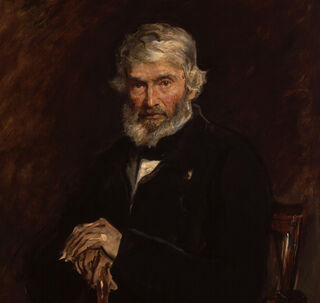Spirituality
How Meaning of Life Was Invented
Thomas Carlyle on how to overcome an existential crisis.
Posted December 4, 2020
Thomas Carlyle (1795-1881), the Scottish author celebrating his 225th birthday on the 4th of December, was a towering figure in 19th-century literature, praised by everyone from Ralph Waldo Emerson and John Stuart Mill to Johann Wolfgang von Goethe. Charles Dickens dedicated his Hard Times to Carlyle, a portrait of Carlyle hung over Emily Dickinson’s writing desk, and James Hutchison Stirling noted that in the 1840s Carlyle “was every literary young man’s idol, almost the God he prayed to.”
What he usually doesn’t get credit for is that he was the man who coined the phrase “meaning of life” in the English language.
In Carlyle’s Sartor Resartus, published in 1833-34, the protagonist loses his faith in God, plunging into an existential crisis that Carlyle called the Centre of Indifference, where nothing really mattered. From a stellar point of view, “What is this paltry little Dog-cage of an Earth; what art thou that sittest whining there? … thou art wholly as a dissevered limb.”
In what Carlyle described as an atheistic century, where the Torch of Science burns so fiercely that “not the smallest cranny or dog-hole in Nature or Art can remain unilluminated,” the comforting religious worldview is “parched away, under the Droughts of practical and spiritual Unbelief.” Repeated disappointment gave rise to doubt, “and Doubt gradually settled into Denial!”
In the midst of this crisis, where “to die or to live is alike to me,” we hear for the first time the modern cry for meaningfulness: “Yet is the meaning of Life itself no other than Freedom, than Voluntary Force.”
Carlyle, like many of us today, felt that he lived in an era during which the voice of God had been silenced, suffocated by the triumph of the scientific worldview. This is the context where the phrase meaning of life was first needed. In using the phrase, Carlyle was directly inspired by German Romantics Novalis and Friedrich Schlegel using the German equivalent to the phrase, der Sinn des Lebens, a few decades earlier in their similar revolt against the rational and mechanistic modern worldview.
Meaning of life thus emerged to describe something that no longer could be taken for granted. It became the symbol of a riddle at the heart of our existence: If human life is an arbitrary and impermanent occurrence leaving no trace on a cosmic scale, then what could make this life worth living?
Carlyle, fortunately, had an answer. His protagonist emerged from The Centre of Indifference with a new foundation for meaning. This is what electrified the young generation in the 19th century. As historian R.L. Brett notes: “It was Carlyle who held out the promise of a vitalistic philosophy which could replace the materialist and mechanistic thought of the preceding century.”
The Ideal is in thyself” Carlyle proclaimed, “the thing thou seekest is already with thee.” Whether or not there is God out there, there is something God-like within us: Our freedom to not succumb to our animal desires but instead be guided by the better angels of our nature. Carlyle’s days of indifference were over when he realized that there is a mandate which “lies mysteriously written, in Promethean, Prophetic Characters, in our hearts; and leaves us no rest, night or day, till it be deciphered and obeyed; till it burn forth, in our conduct, a visible, acted Gospel of Freedom.”
What we find in our heart, according to Carlyle, is a call of duty to work. “Work thou in Welldoing” is our mandate. By engaging in purposeful work, we fulfill our role, and make our existence meaningful.
What you ought to do in life is not found in some abstract ideal but by carefully examining the situation you are currently in: “In this poor, miserable, hampered, despicable Actual, wherein thou even now standest, here or nowhere is thy Ideal.”
Carlyle’s recipe for a meaningful existence is thus simple. Assess your current situation: What are your capabilities and resources? What could be better in your life and in the lives of those around you? What could you realistically do to make these good things happen? By this kind of realistic assessment of your current situation, you already know what ought to be done:
“To each is given a certain inward Talent, a certain outward Environment of Fortune; to each, by wisest combination of these two, a certain maximum Capability. But the hardest problem were ever this first: To find by study of yourself, and of the ground you stand on, what your combined inward and outward Capability specially is.”

If you have much capacity, do much. Tackle some grand challenge of our time like malaria, climate change, or poverty. If you have little capacity, do what little you can in your immediate social surroundings. Don’t wait for some commands carved in stone to drop from the sky to provide absolute clarity and direction. Instead, start from where you are right now. Examine your current situation, your interests, your capabilities, and the ailments around you that you could realistically address. Then go out and ”Do the Duty which lies nearest thee.” Meaningful existence is that simple. It is a call to action, using what is within you to bring forth a slightly better world. And you’d better start today. For as Carlyle notes:
“’Tis the utmost thou hast in thee; out with it then. Up, up! Whatsoever thy hand findeth to do, do it with thy whole might. Work while it is called To-day, for the Night cometh wherein no man can work.”




